Recent Articles
Popular Makes
Body Types
2021 Lexus RC vs. 2021 Infiniti Q60
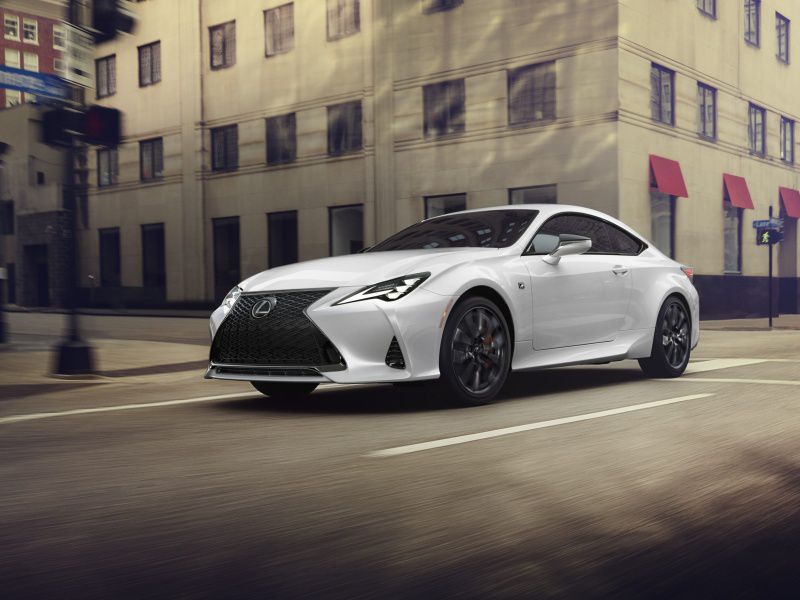
2022 Lexus RC ・ Photo by Lexus
So many beautiful sports coupes are also hardcore performance cars. An auto enthusiast might balk at applying that term too liberally, but it’s certainly true that sporty style usually comes with sporty performance. And sporty performance often gets in the way of everyday livability — for instance, with a stiffer ride, a smaller interior, or a higher price tag.
When you want a healthy dash of sporty flavor without giving up too much comfort and luxury, two relatively affordable options are the Infiniti Q60 and the Lexus RC. These luxury two-door coupes are each priced from the low $40,000s but look like they cost more. They’re both available with at least 400 horsepower. And both of them surround their quiet, leather-lined cabins with racy-looking sheetmetal. If that sounds like your type of car, keep reading as we compare the RC and Q60 across eight categories and then name our overall winner.
Exterior Design
Neither the RC nor the Q60 is a brand-new vehicle. The Infiniti has changed little since its debut in 2017, and the Lexus dates all the way back to 2015. Still, there aren’t many luxury coupes on the road, which helps both these slick two-doors continue looking fresh.
The Q60 has an upright front end that it shares with the Q50 compact sports sedan. But the rest of this coupe looks low and wide, with a roof that dips down smoothly toward the trunk. A high rear bumper reaches almost to the top of the trunk, which also helps the Q60 look big and purposeful. In fact, its dimensions are nearly identical to the RC’s. Still, the Lexus is no design slouch either. We’re particular fans of the car’s 2019-model restyling, which dialed back the front end’s aggression in favor of more elegance. At the same time, widely available body kits and a creased rear bumper separate the RC from Lexus’s sedans, imparting a more frenetically fast vibe than the Q60’s graceful beauty. We’ll let you choose your own aesthetic.
Tie
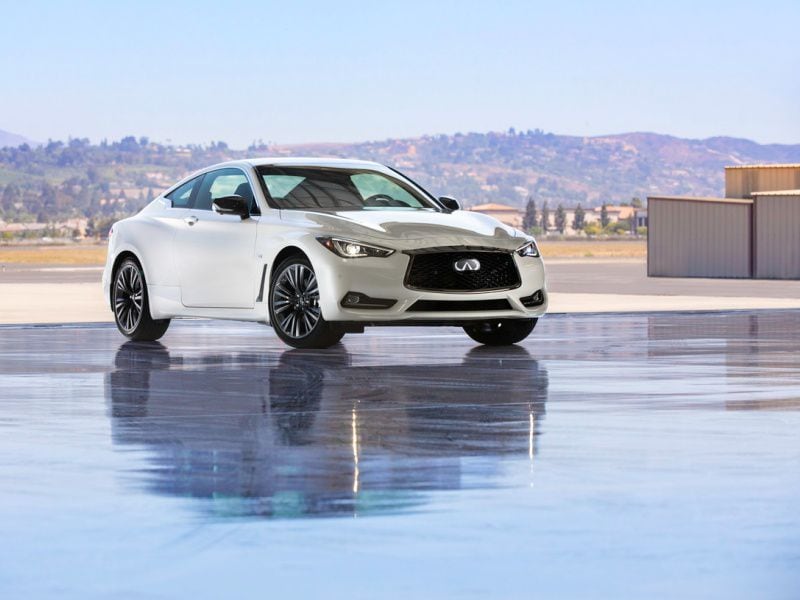
Photo by Infiniti
Interior Design
Trendsetting designs and cutting-edge technology are two typical advantages to a luxury car. The aging RC and Q60 are nicely finished, but they’re showing their age. Our pick is the RC.
Although the RC is older than the Q60, that Infiniti shares its interior with the even older Q50 sedan — which wasn’t the most modern even when it hit the market in 2013. It has a tall dashboard with an instrument panel spreading vertically all the way from the top to the bottom. It has two infotainment touchscreens stacked on top of each other, each responsible for different functions and operating independently. It’s a different vibe from the extra-sleek interior. The RC’s interior looks more like what we expect from a luxury sports coupe — it’s simpler and more conventionally modern. There’s an infotainment screen up at the top (7 inches on the base model, 10.3 inches as an extra-cost option), with dashboard vents separating it from the controls below. We’ve never liked Lexus’s touchpad-based infotainment system, which is more distracting to use than the Infiniti’s touchscreens. But overall, we think the RC’s interior matches its exterior better than the Q60’s.
Lexus RC
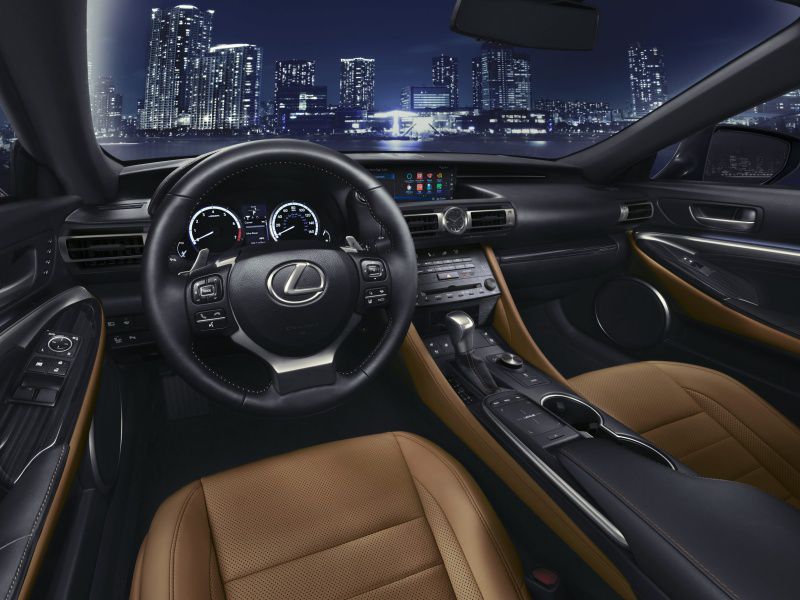
Photo by Lexus
Interior Space and Comfort
Both the Q60 and RC have comfortable, supportive front seats. They’re more aggressively bolstered than you’d find in the typical luxury sedan, which is great news if you like that sporty snugness but more confining than some people might pick. If you’re looking for flatter seats, a higher seating position, and better rear visibility, a sedan is probably your better option.
And that’s even before we mention these coupes’ little rear seats. Adults can wedge themselves in, but not comfortably. The Q60 has a bit more space in the back, though, and there’s a handy feature: While both cars’ front seats slide back automatically — to the consternation of anyone sitting behind — only the Infiniti has a button that the rear passenger can use to cancel the move. The Q60 also has just a bit more rear legroom, and the front-seat area felt wider to us as well. Though neither of them has much trunk space, RC’s is a bit bigger: 10.4 cubic feet versus the Q60’s 8.7 cubic feet. Another RC advantage: heated front seats are standard equipment, but they’re missing from the base Q50. You can decide for yourself which of these minor differences matter more.
Tie
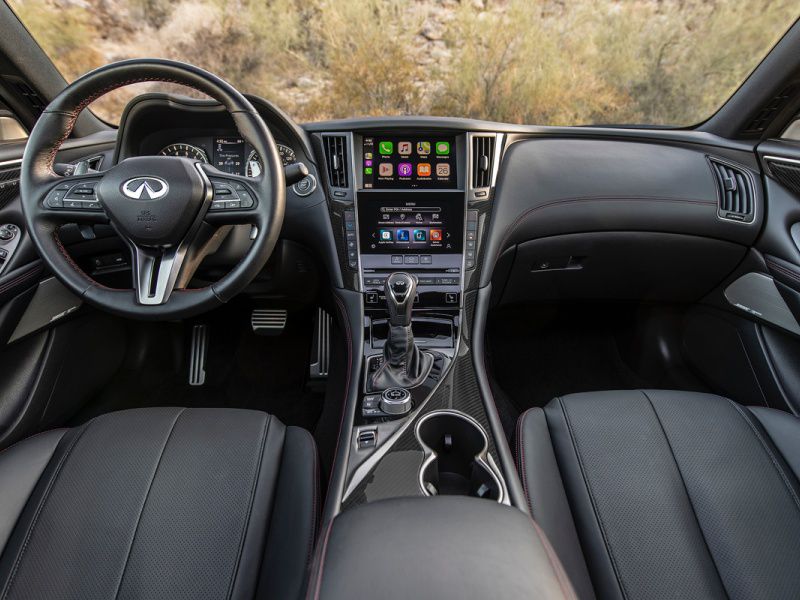
Photo by Infiniti
Ride and Handling
The Q60 and RC are both on the heavy side for performance vehicles. That gives them a big-car feel that some drivers will appreciate; others will wish for sporty coupes to be lighter and more tossable.
Between the two coupes, we narrowly chose the Infiniti. We found its steering a bit sharper and more responsive than the Lexus’s. Otherwise, the experience is similar: Both coupes have composed handling without exquisite precision or the highest possible handling limits. Even their performance models, the RC F and Q60 Red Sport 400, are more capable than exciting. To be clear, these aren’t “pretenders” — the Q60 and RC both ride on rear-wheel-drive-based luxury-car platforms with available all-wheel drive. They’re just not the finely honed performance machines you’d find at a BMW or Audi dealership. Still, if you don’t want something too stiff or noisy, and want something with more connection to the road than an everyday car, both the Q60 and RC deliver.
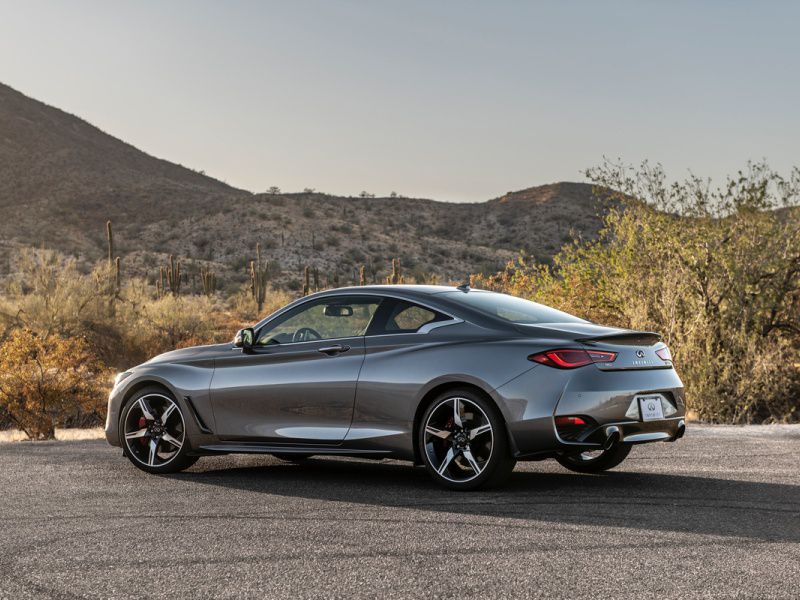
Photo by Infiniti
Acceleration
The Lexus RC lets you choose among four different engines with a confusing lineup of names. The base engine, on the rear-wheel-drive RC 300, is a turbocharged four-cylinder with a modest 241 horsepower and 258 pound-feet of torque. It’s hardly economy-car slow, but it’s nothing invigorating. It’s the only turbo in the RC lineup. The all-wheel-drive RC 300 upgrades to a 3.5-liter V6 with 260 hp and 236 lb-ft of torque; it’s quicker and sounds richer. You can also get a livelier version of the same V6 in the RC 350 model; it makes 311 hp and 280 lb-ft of torque with either rear- or all-wheel drive. At the top of the line is the RC F, which packs a big old-school 5.0-liter V8 with 472 horsepower and 395 lb-ft of torque.
The Q60 has a simpler lineup of two turbocharged 3.0-liter V6 engines. On most models, it makes 300 hp and 295 lb-ft of torque. On the Red Sport 400, it makes 400 hp and 350 lb-ft. The base Q60 blows away the RC 300s and matches the RC 350, while the Red Sport isn’t far behind the V8-powered RC F.
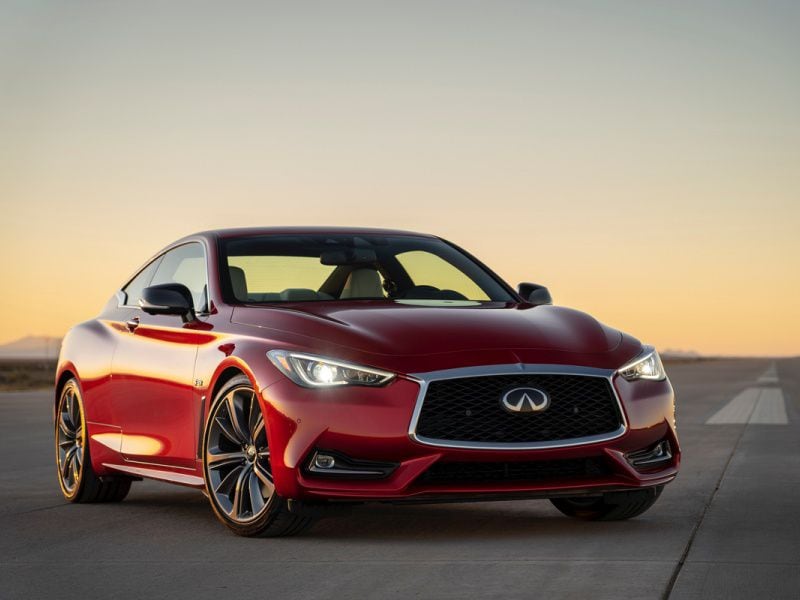
Photo by Infiniti
Fuel Economy
The RC’s smaller engines help out at the pump. The four-cylinder RC 300 gets an EPA-estimated 21 mpg in the city, 31 mpg on the highway, and 25 mpg combined. The rear-drive RC 350 isn’t even so far behind, at 20 mpg city, 28 mpg highway, and 23 mpg combined. AWD models use a six-speed automatic transmission instead of the rear-drive RCs’ more efficient eight-speed, and both manage 19 mpg city, 26 mpg highway, and 22 mpg combined. The RC F scores 16 mpg city, 24 mpg highway, and 19 mpg combined.
Every Q60 scores within 1 mpg of 20 mpg city, 27 mpg highway, and 22 mpg combined — regardless of the engine or drivetrain you select. That means that some Q60s are slightly more economical than the most comparable RC models, but the turbo Lexus will save you money at the pump.
Lexus RC
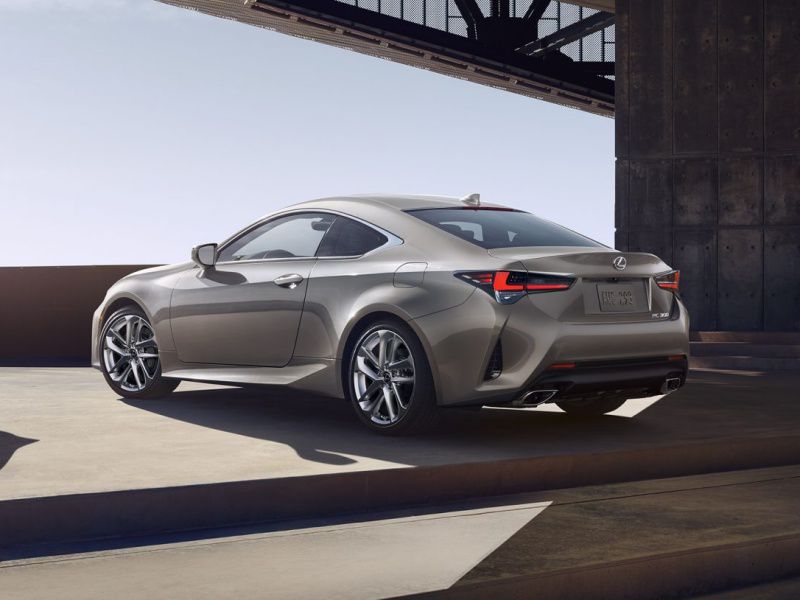
Photo by Lexus
Safety
The Lexus RC comes standard with a suite of advanced safety and driver-assistance features: a forward-collision warning with pedestrian detection and automatic emergency braking, a lane-departure warning with lane-keeping steering assistance, blind-spot monitoring with a rear cross-traffic alert, and adaptive cruise control. It also earned top scores in Insurance Institute for Highway Safety crash testing.
The Q60 is unusually stingy about its safety technology, especially for a luxury car. Of all those Lexus features, only the forward collision warning (without automatic braking) is available on the Infiniti’s base model. That forces a costly upgrade to get those basics — which are standard even on economy cars from Infiniti’s Nissan parent. And the Q60 hasn’t been crash-tested.
Lexus RC
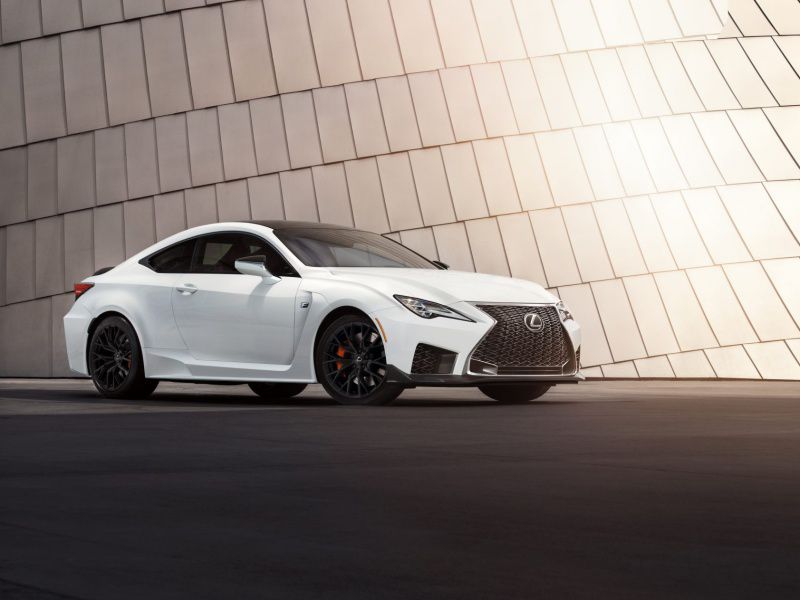
Photo by Lexus
Pricing and Features
Going merely by base prices, the Q60 edges out the RC. The Infiniti Q60 Pure starts at $41,750, while the Lexus RC 300 begins at $42,220. The gap widens if you consider that the Q60 has a standard 300-horsepower V6, lining up more closely with the RC 350 ($45,250).
Still, the base RC comes standard with all those safety features that Infiniti saves for the Q60 Luxe ($50,300). It’s also widely available with heated seats (also restricted to the Luxe) and ventilated seats (which the Q60 doesn’t offer at all). If you want the most horsepower, the Q60 Red Sport 400 starts at $58,200, which comfortably undercuts the admittedly more powerful RC F ($65,720). Overall, we’ll call this category a tie: If you measure value by horsepower per dollar, Infiniti dominates, but Lexus has a lot more features for just a bit more cash.
Tie
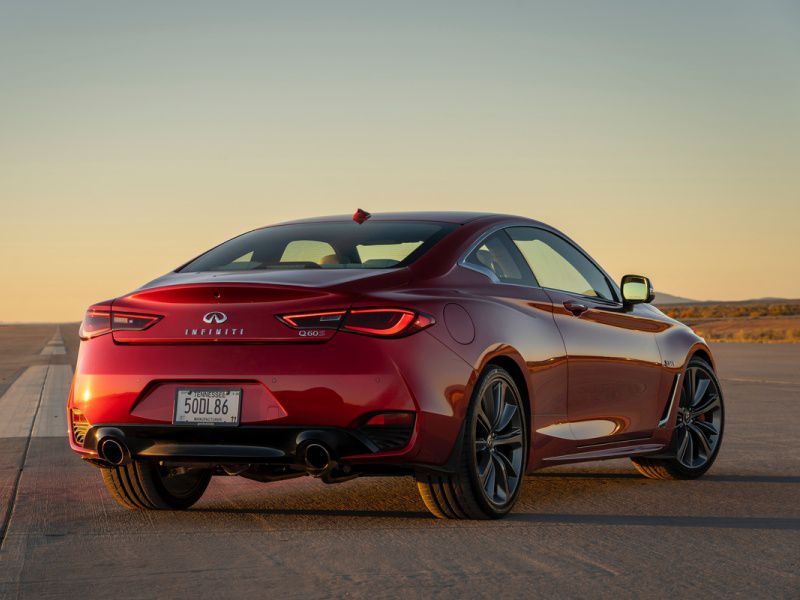
Photo by Infiniti
Final Thoughts
The Q60 is a tempting luxury sports coupe. It looks cool and goes fast, even in its base form. And it’s a high-end vehicle — comfortable and well-finished — not some bare-bones performance car. Still, we’re going to pick the Lexus.
The RC and Q60 are both tailored for someone who wants the sporty design of a low-slung two-door car, but also wants everyday comfort and luxury. And with its additional standard luxury and safety features, more modern interior design, bigger trunk, and economical four-cylinder engine, we think the Lexus meets that need better. If you’re a horsepower junkie and don’t mind forgoing a few luxuries, or if you’d buy the Q60 Red Sport 400, the Infiniti’s tempting power, sharper steering, and lower base price are appealing. Otherwise, the Lexus comes out on top. However, if you’re not attached to these coupes’ more dynamic styling, we’d encourage you to also consider spending extra for more modern, sharper-driving competitors like the BMW 4 Series and Audi A5 and S5.
Lexus RC
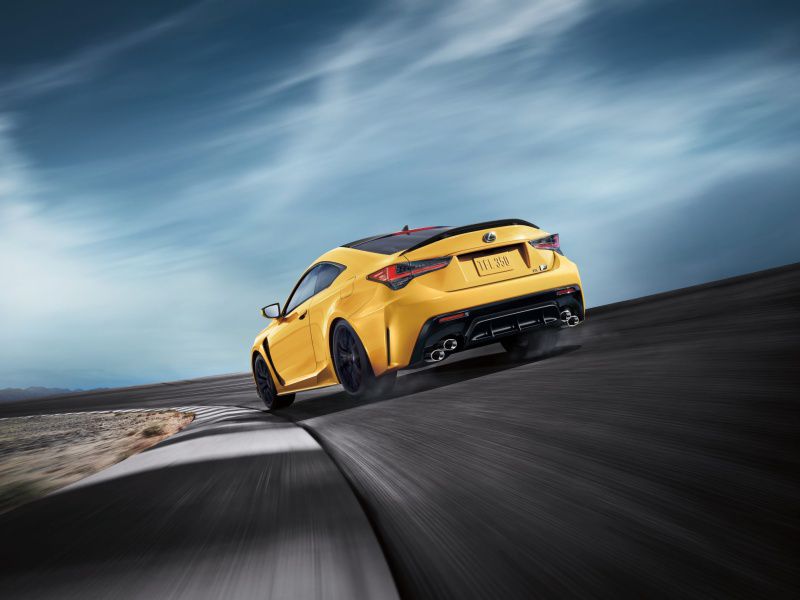
Photo by Lexus